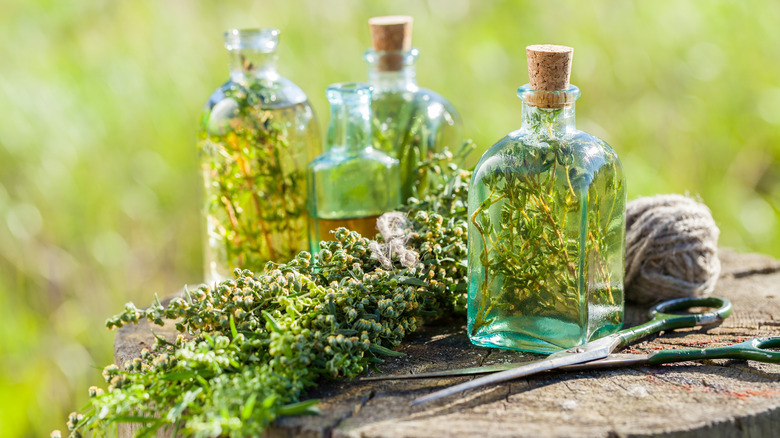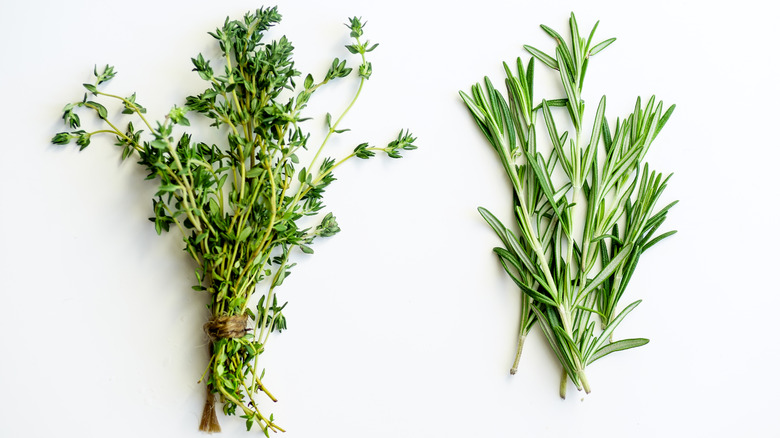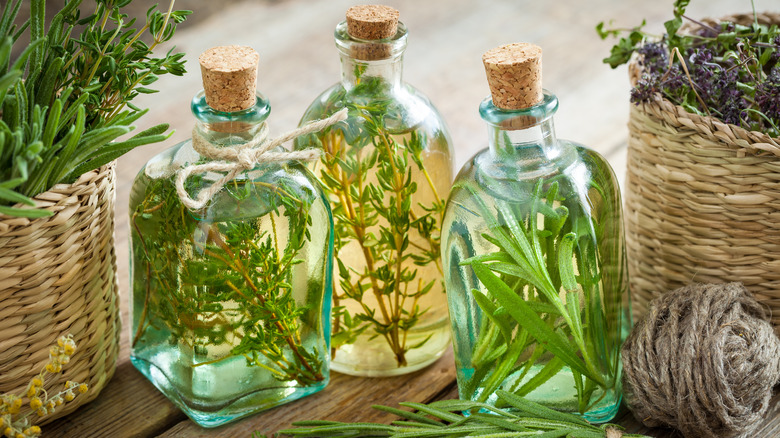Preserve Homegrown Herbs In Delightful Infused Vinegars
If you cringe when tossing out faded herbs that have passed their prime, you're not alone. Those aromatic earth offerings add so much to our meals, especially if they're homegrown with lots of hands-on care. But there's an easy way to preserve those culinary treasures before they lose their luster, and it involves simple vinegar available at any supermarket.
When sold in specialty or farmer's markets, infused vinegars may seem exotic, and often pricey, but there's no reason you can't create an endless array of flavored vinegars in your own kitchen. Think rosemary, thyme, tarragon, dill, basil, sage, cinnamon, and dozens more just waiting to settle into glass bottles filled with white, rice, cider, or red wine vinegars.
Before long, you'll be drizzling infused vinegar creations over or into salad dressings, vegetables, grilled meats, sauces, stews, scrambled eggs, and just about anything edible. Herbs have a relatively short shelf life when plucked fresh from the plant, but a rebirth in vinegar keeps them flavoring up your meals for weeks or months longer when properly stored.
The process is quite simple, so pluck some pretties from your garden or salvage some sprigs from that pre-picked packet in your fridge. With a few steps and a little patience, you'll be proudly splashing that tangy, tart elixir around your kitchen.
Gather your herbs and choose your vinegar
The first, and obvious, ingredient you'll need for making herb-infused vinegars is the herbs. You don't even need hearty handfuls for infusing; sometimes even a spring or two will do the trick. If need be, you can even make vinegar magic from dried herbs already in your pantry.
The type of vinegar you use will affect the outcome, so feel free to experiment when pairing with available herbs. Clear white vinegar absorbs aromatic flavors well, and it provides a good neutral base for experimenting. Just be aware that it's more acidic, so you may want to combine it with another type of vinegar after you get more adventurous and comfortable with the process. Rice vinegars carry a milder, lighter tone, while cider vinegars made from fruits tend to be sweeter. If using red wine vinegar, heartier herbs like rosemary or thyme will stand up to the extra pungency.
Wash the herbs and pat dry before adding them to the vinegar. Some experts recommend first dipping them into a solution of ½ teaspoon unscented household bleach and 3 cups of water to eliminate any bacteria that may be lurking in the leaves. Make sure your jars and bottles are clean and sterilized in simmering water for at least 10 minutes. It's a good idea to infuse the vinegar in a wide-mouthed jar and then transfer it later to a slimmer bottle with a pouring spout.
Add that herbal magic
Now it's time to drop in those fragrant sprigs or leaves and let them do their thing. You'll eventually come up with your own vinegar infusion recipes, but an easy way to start is to use a few sprigs of tarragon or about five basil leaves per cup of white vinegar. Feel free to combine two or more complementary herbs if you'd like.
Press the herbs gently to release the natural oils, and place them in the glass jar. For a more nuanced flavor, add a clove of garlic or some whole black peppercorns. On the stovetop, simmer the vinegar until warm but not boiling, and then pour it gently over the herbs. Let it cool to room temperature, cover it with the lid, and refrigerate for about two weeks for the deepest flavor infusion.
Remove the herbs and any other additions before transferring the liquid into a tightly capped glass container. You'll be enjoying your edible artisan creation for at least three months when refrigerated.
Now you're feeling like an expert, so go wild with Mother Nature's bounty. Try adding perky little accompaniments such as lemon zest, orange peel, cinnamon sticks, chili peppers, lavender leaves, or even red pepper flakes for a zingy bite. Expand your vinegar options to include cider, champagne, and wine vinegars.


